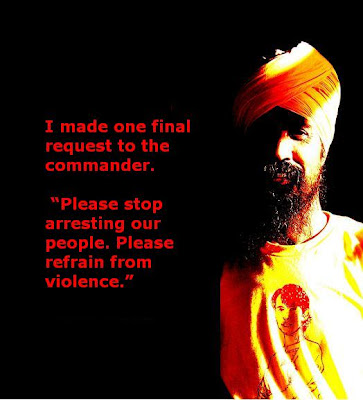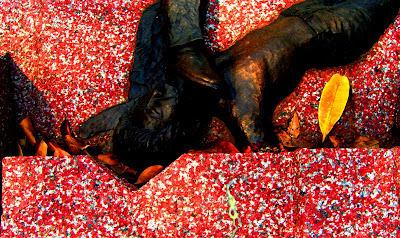 Concerning what Time Magazine called "the second biggest story of 2007," Jotman traveled to a safe house on the Thai-Burma border where he listened to the astonishing story of how a non-Buddhist -- an ordinary man -- become so deeply moved by the cause of Burma's monks that he himself became one of the protest leaders.
Concerning what Time Magazine called "the second biggest story of 2007," Jotman traveled to a safe house on the Thai-Burma border where he listened to the astonishing story of how a non-Buddhist -- an ordinary man -- become so deeply moved by the cause of Burma's monks that he himself became one of the protest leaders.
How did a Sikh named U Pan Cher come to lead his fellow Burmese in protest? Here is the segment of the interview where U Pan Cher answers this question.
JOTMAN: How did you arrive here in Thailand?
U PAN CHER: I participated in the September Movement from the beginning until the end. Because of this, the military government has been looking for me; I could not stay in Rangoon. Now that I am in Thailand, I want to inform the world about what has been happening in my country.
JOTMAN: Please tell me something about your background.
U PAN CHER: I was born in Burma and grew up in Burma. I am a businessman -- a car-broker. I don't belong to any political organizations.
Although I am Sikh, I admire Buddhism. It is also a part of my religious life. I was very shocked that the government had cracked down on the Pakkoku* monks. Not only me -- all the people of Burma experienced a burning saddness about the Pakkoku incident. At that time, around September 11, I heard that monks in Rangoon were going to protest the military regime. So I joined up with some monks I knew.
We had seen the violence against the monks. Also, there were the price hikes.** At that time the military government ignored every demand the people made.
As for my participation in the protests, nobody organized me, nobody motivated me. I participated by myself of my own free will.
You see, in the seven towns, the people came to the protests by their own decision. People dared, they bravely entered the protests. This fact made our protest very different from the military organized protests. Nobody lured me to participate. I had been joined up with the protest movement since September 12th.
Then I left my business, I left my family. In fact, I have had no contact with my family since then.
JOTMAN: Did you know other protest participants?
U PAN CHER: There were some other businessmen. I was participating openly from the 18th, and after the 19th and 20th I came across some friends at the protest. Actually, for me I didn't think I would end up participating at the forefront of the people. I was actually just thinking to support the monks.
But on the 13th and 14th I heard about Mi La Theyn. She left her new born baby to lead the protest. I heard this on the news -- the VOA/BBC Burmese news.
Another time I was in a teashop watching CNN. On CNN, a woman (Su Su Buri from the NLD) was struggling with a USDA plainclothes military agent. They tried to arrest her. It was a moving experience to witness her defiance.
These two women stood at the forefront of the peoples’ movement. These women had decided to lead. I thought hard about how these women had decided to take lead.
JOTMAN: What else were you thinking?
U PAN CHER: And I am thinking: These woman are bravely fighting for justice. And so I made a decision to do something for my people; to participate more openly and strongly together with the monks.
_________
Note: This is the third installment from my exclusive three-hour interview with U Pan Cher. To see all posted segments of our discussion, please
click here. You may also be interested to read my other
coverage of the Burma crisis, including interviews with escaped monks, and monks' protest leader Ashin Kovida.
*
Pakkoku uprising. "On Sept 5, 2007 Burmese troops forcibly broke up a peaceful demonstration in Pakkoku and injured three monks. The next day, younger monks in Pakokku briefly took several government officials hostage in retaliatio
n. They demanded an apology by the deadline of September 17, but the military refused to apologize. This sparked protests involving increasing numbers of monks in conjunction with the withdrawal of religious services for the military. Their role in the protests was significant due to the reverence paid to them by the civilian population and the military. After these events, protests began spreading across Myanmar." (Source:
Wikipedia)
**
Price hikes. "On August 15, 2007 the government removed subsidies on fuel causing a rapid and unannounced increase in prices. The government, which has a monopoly on fuel sales, raised prices from about $1.40 to $2.80 a gallon, and boosted the price of natural gas by about 500%.
This increase in fuel prices led to an increase in food prices. " (Source:
Wikipedia)


























